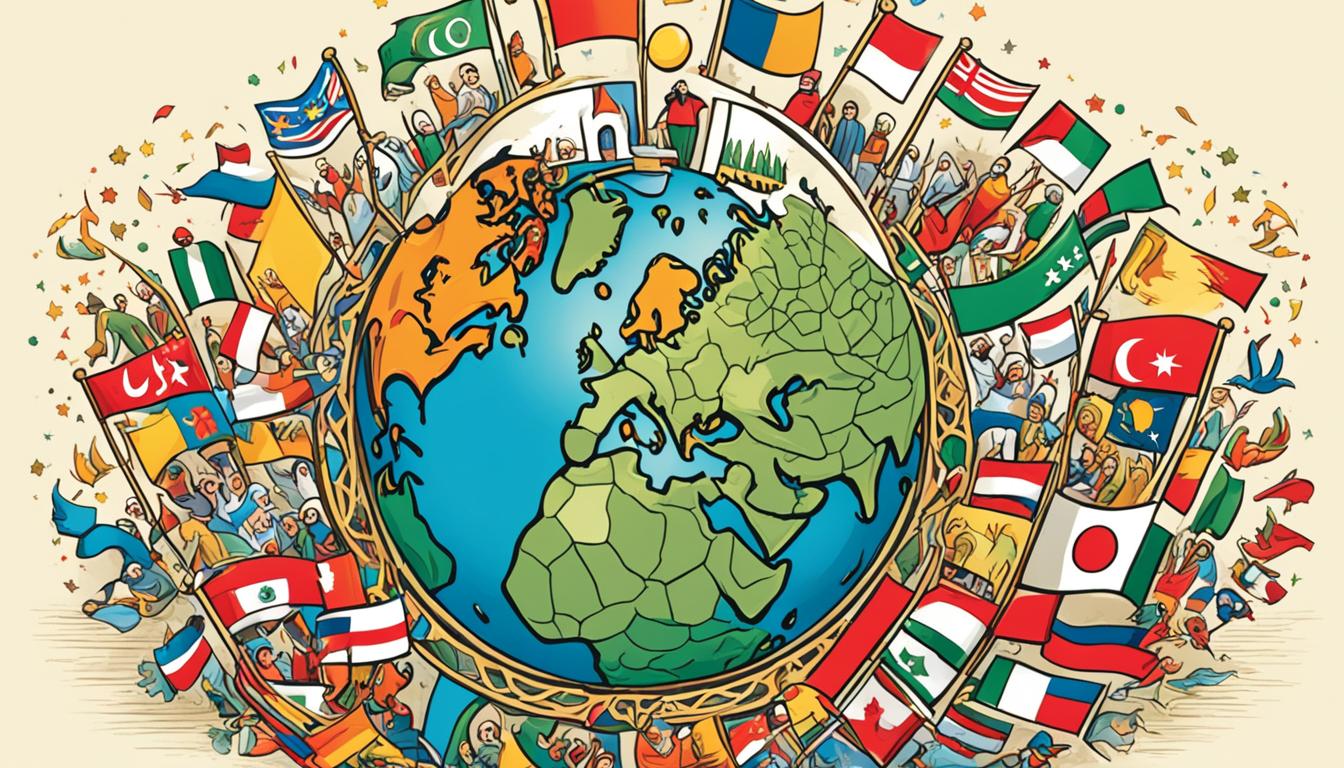Islam: A Universal Faith? Explore the Truth.
Islam comes from the Arabic word meaning “peace and submission.” It’s seen as more than a religion; it’s a guiding force for many worldwide. The question is Islam a universal religion points to its message of hope and guidance for all people.
It focuses on monotheism, community, and compassion. The global religion Islam aims to unite followers under one God, Allah. The Holy Qur’an, revealed to the Prophet Muhammad, is key to this faith. It teaches the importance of giving up one’s will to God.
This makes us think about the religion of Islam worldwide impact and what draws millions to it.
Key Takeaways
- The essence of Islam is based on the principle of peace through submission to God.
- Muslims adhere to six fundamental principles of faith that shape their understanding of Islam.
- The declaration of faith, or Kalimah Tayyeba, articulates the core belief: “La ilaha ilAllaho Muhammadur rasoolAllah.”
- All prophets, including those mentioned in the Holy Qur’an, share a common message of monotheism.
- Islam recognizes sacred texts from Judaism and Christianity, underscoring its position within the Abrahamic traditions.
- The belief in angels and the Day of Judgement is essential in Islamic teachings.
- Islam’s universal values serve as a source of inspiration for promoting global unity and compassion.
The Essence of Islam: A Glimpse into its Meaning
Islam is a path to peace, based on following divine instructions. It teaches to worship Allah, blending personal devotion with helping others. Followers of Islam show their faith through actions that help the community. The essence of Islam combines faith, action, and a legal code for personal and social peace.
Praying five times a day is a key part of this belief. These prayers include specific gestures and sayings in Arabic. This language adds emotional depth, making the experience meaningful for 1.25 billion Muslims worldwide.
Islam promotes a leadership that values justice, ethics, and kindness. The Quran’s chapter Surat Al Baqara talks about different roles in spreading God’s message. It highlights the importance of community leaders and the Pillars of Islam, which help build good character.
- The significance of Ramadhan as a month for religious engagement.
- Reading the Quran shows commitment; many aim to finish it during this month.
- Islamic architecture and art beautifully encapsulate serenity and peace.
- Followers view Prophet Muhammad (SAW) primarily as a model dedicated to the divine.
The Quran is seen as the holy book, offering guidance beyond cultural limits. Arabic is key for sharing these teachings, showing its deep value. Through practice and following islam universal beliefs, Islam shapes its followers’ lives and fosters peace in society.
Understanding the Universal Message of Islam
The universal religion of Islam is built on the idea of monotheism. This means believing in one God, Allah. It brings people together, beyond their differences, towards unity and understanding.
This belief in one God is at the heart of Islam. It shows a way of life that values peace, justice, and kindness for everyone.
Monotheism and Its Importance in Islam
Monotheism is key to Islam. It teaches that there is only one God. The Qur’an starts by saying: “All praise belongs to Allah, Lord of all the worlds.” (Ch. 1: V2).
This shows that God is the one creator and supporter of all. It calls people to learn about His nature and qualities. This belief makes all humans equal, no matter their race or social status.
Islam teaches that being good and pure is what truly matters. It says we should judge people by their actions, not their looks or background.
All Prophets Sharing a Common Message
Many prophets have shared a message of guidance throughout history. The Qur’an says God sent prophets to all people, showing that divine guidance is for everyone. This idea is very important.
It means that prophets from different religions, like Christianity and Judaism, also played a part in revealing truth. The prophet Muhammad is seen as the final messenger, bringing together all these messages. He is called a “mercy for all peoples” (Ch. 21: V108).
This shows Islam’s goal to bring people together in faith. By recognizing prophets from all traditions, Islam encourages a sense of brotherhood and equality. It calls for everyone to work together based on these shared teachings.
Islam’s Core Beliefs: A Foundation for a Global Religion
The Islamic faith has core beliefs that guide over 1.9 billion followers. These beliefs focus on the six articles of faith and the five pillars of Islam. They show how Islam shapes followers’ lives and keeps a strong community and morality.
The Six Articles of Faith
Every Muslim must believe in six key tenets. These include:
- Belief in Allah, the one true God
- Faith in the angels created by God
- Acceptance of the holy books, including the Qur’an
- Recognition of the prophets, with Muhammad being the last
- Belief in the Day of Judgement
- Understanding divine decree, God’s will regarding fate
These beliefs unite Muslims, showing the unity of God and the importance of following prophets and scripture.
The Five Pillars of Islam
The five pillars of Islam show faith in action, connecting followers to their community and God. They are:
- Shahada: Declaring faith, saying there is no god but Allah and Muhammad is His messenger.
- Salah: Performing five daily prayers towards Mecca, showing discipline and connection to God.
- Zakah: Giving 2.5% of wealth to help the poor, promoting charity and social welfare.
- Sawm: Fasting in Ramadan, showing empathy for those less fortunate.
- Hajj: Making a pilgrimage to the Ka’bah once in a lifetime, if possible.
These practices are personal but also unite the community. They make the faith relevant worldwide. They teach social responsibility and spiritual devotion, helping Muslims feel part of a global community.
Is Islam a Universal Religion? Examining the Question
Many see Islam as a universal religion because of its teachings that reach everyone. It’s about unity and understanding among different cultures and communities. This makes people feel connected and valued.
There are about 1.9 billion Muslims around the world, making them the second-largest religious group. Over fifty countries have a majority of Muslims. In the U.S. and Europe, there are also many Muslims, showing Islam’s global reach.
The Sunni and Shia branches of Islam show its diversity. Different sects lead to lively debates among scholars and followers. These debates add to the faith’s rich tradition of interpretations and practices.
Islam teaches about justice, compassion, and peace. These values touch people all over the world. They make people think about how these teachings can be applied everywhere. Islam’s nature encourages different views, making it a universal religion.
Islamic Teachings That Appeal to a Global Audience
Islamic teachings for all highlight values that touch people worldwide. They talk about compassion and justice, which shape how we treat each other. These values help build strong communities and respect among people.
Values of Compassion and Justice
Compassion is key in Islamic teachings. The Quran tells followers to be kind and fight for justice, no matter the situation. For example, Quran 4:135 asks Muslims to be fair and honest, no matter one’s social status. This belief in treating everyone with respect is a core Islamic value.
Principles of Sincerity and Goodwill
Islamic teachings also focus on being sincere and having goodwill. These ideas guide Muslims in their everyday actions. They encourage honesty and clear communication, building trust worldwide.
The Historical Spread of Islam: A Global Reach
Islam started in Arabia and quickly spread across the world. After the Prophet Muhammad died, Muslim forces took over many lands. These included Persia, Iraq, Syria, and Egypt. This fast growth set the stage for a huge religion.
Early Expansion through Arabia and Beyond
Islam showed its ambition early on. It aimed to take over the Byzantine Empire, especially Constantinople. After Muhammad died, there was a quick takeover of many territories. Key events were:
- The establishment of a united Islamic empire under the Umayyad dynasty, which lasted nearly a century.
- The Abbasid dynasty’s rise in 750 AD, moving the Islamic capital to Baghdad and creating a hub for culture, science, and religion.
- The dynamic role of Sufism that spread Islam to areas beyond the Middle East, greatly affecting Southeast Asia and Africa.
Current Global Muslim Population Statistics
Today, there are about 1.8 billion Muslims worldwide, making it one of the fastest-growing religions. They live in:
- 40 countries where they are the main religion.
- Five continents, with big groups in South Asia, the Middle East, and Southeast Asia.
Countries like Indonesia and India have a lot of Muslims. This shows how Islam has grown over time. It’s shaped by trade, marriage, and cultural sharing.
The Role of the Qur’an in Islam’s Universal Appeal
The Qur’an is a key part of the islamic faith for people all over the world. It has been unchanged since the 7th century. This makes it a trusted guide for millions.
Its original message has stayed the same, connecting followers deeply with their faith.
Scriptural Authority and Guidance for All
The Qur’an is the main religious book for many. It guides people in life, from how to act with others to fighting for justice. It teaches the importance of believing in one God, who is full of love and mercy.
This belief shapes how followers live and treat others. The book also talks about how to run a society, handle gender issues, and more. It reaches out to different cultures, showing it can connect with many people.
Qur’an’s Ethical and Moral Teachings
The Qur’an is easy to remember because of its beautiful style. It teaches about being kind, giving to others, and praying. These lessons create a strong moral base that people everywhere can understand.
It also makes people think about their actions and how they affect others. Scholars say the Qur’an is right about the natural world, linking its teachings to our everyday lives. The messages in the Qur’an bring people together, showing how we can all live in harmony.
Islam’s Interaction with Other Religions
Islam values talking with other faiths, showing deep respect for them. This dialogue helps build peaceful relationships and understanding among people with different beliefs. By working together, Muslims can find common ground with others, showing the importance of living together in our world.
Inclusion and Respect in Interfaith Dialogues
The Quran encourages talking with others to understand and appreciate each other. It sees Jews and Christians as “People of the Book,” worthy of respect. This idea has played out in history, with non-Muslims enjoying different levels of freedom and acceptance under Islamic rule. By talking, Muslims can show what they share with other religions, leading to peaceful living together.
Shared Values with Judaism and Christianity
Sharing values like kindness, fairness, and seeking truth helps in talking with other religions. These beliefs are key in Islam, Judaism, and Christianity. They create a base for people to come together, aiming for a better world. Through open talks, followers of these faiths can tackle common problems and celebrate their shared values, building unity in our differences.
Islamic Faith: A Worldwide Impact on Society
The Islamic faith goes beyond just spiritual practices. It deeply affects society through community service and helping others. This belief in helping others comes from Islamic teachings. It shows up in many charitable efforts around the world.
Community Service and Altruism
Community service in Islam is more than just being kind. It’s a key part of how Islam changes society for the better. Muslims are urged to do charitable work for many reasons:
- Uplifting the needy: Many Muslims help out in groups that fight poverty and offer basic needs to those who need them.
- Fostering a sense of unity: Helping out brings people together, making the idea of working together stronger.
- Promoting moral values: Being kind and generous are big parts of Islam. Followers are pushed to help those who are less lucky.
There are many examples of this, like local food drives and big efforts to help during emergencies. These actions show how Islam deeply affects society’s harmony and teamwork.
Islam’s Universal Values: A Source of Inspiration
Islam’s teachings are a deep source of inspiration. They are based on human rights and taking care of the environment. These values create a place where everyone’s dignity and equality matter most. They teach us to live responsibly and respect each other and nature.
Human Rights and Equality in Islam
Islam deeply values human rights. It believes all people are equal and deserve respect and justice. The Quran and Hadith teach us to be kind to others, building a strong community. These teachings of fairness and justice apply everywhere, making them for everyone.
Environment and Sustainability in Islamic Doctrine
Islam also cares about the environment, teaching us to live sustainably. Muslims see taking care of the Earth as part of their faith. This view connects caring for the planet with our rights as humans. It encourages us to work together for a better future.
The Diversity Within the Islamic Community
The Islamic community shows a wide range of diversity, making it rich and global. This diversity is seen in the many sects within Islam, like Sunni and Shia. Even though both share basic beliefs, they see some practices and traditions differently. This difference is key to understanding Islamic faith.
Sects in Islam: Sunni and Shia Perspectives
Sunni and Shia sects show some big differences in Islam. Sunnis make up most of the group and believe in the community’s role in understanding Islamic texts. Shias believe in the Imams, who come from the Prophet Muhammad’s family. Both groups focus on the Quran and the Prophet’s ways, showing the deep diversity in Islam.
National and Cultural Variations of Islamic Practice
Islam is not just one thing; it’s full of cultural expressions. Different countries and communities have their own ways of practicing Islam. For example, in Africa, Asia, and South Asia, religion is a big part of everyday life. In the West, people mix local customs with their faith.
This mix shows how culture and identity affect Muslims all over the world. It proves that while beliefs are shared, how people practice their faith can vary a lot.
The Misconceptions Surrounding Islam Today
Misconceptions about Islam often come from a narrow view, fueled by the media. These portrayals can twist the true nature of a faith that values peace, compassion, and justice. It’s crucial to look closely at these media portrayals to get a clearer view of Islam.
Media Representation and Its Impact on Perception
The way the media shows Islam greatly shapes what people think. After September 11, 2001, Muslims faced a lot of scrutiny, often tied to extremists who wrongly interpret Islamic teachings. With over a billion Muslims worldwide and 56 Islamic states, it’s hard to see all Muslims as one because of a few’s actions. This leads to stereotypes, like wrong ideas about jihad and too much focus on violence, hiding the peace in the Qur’an.
Countering Stereotypes with Facts
To fight misconceptions about Islam, we need to focus on facts and education. The Qur’an and Hadith teach about human rights and equality. For example, the Qur’an says you can’t force someone to believe, which goes against violent extremist views. Islam sees Jesus as a prophet but doesn’t say he was God, showing similarities with other religions. Talking openly and through education can help people understand Islam better, showing its diversity.
Conclusion
Islam teaches universal values that go beyond borders, cultures, and time. It’s a faith with strong beliefs, ethics, and a focus on community. This makes it important to ask if Islam is a universal religion. The answer lies in its wide appeal to over 1.5 billion people worldwide, showing a strong dedication to peace.
But, some people twist these teachings, leading to violence and conflict. This brings up big questions about how we work together and the importance of talking across faiths. By focusing on what we agree on, religious leaders can help build peace and solve conflicts.
Working together across faiths helps us understand each other better and clears up wrong ideas about Islam. Looking into Islam’s teachings shows that unity among different faiths can create a better future. It proves that Islam is a global religion of peace, unity, and cooperation.
Source Links
- Chapter 1: Islamic Beliefs and Teachings
- Islam and Its Message: How Is It Distinguished from Other Religions?
- Bjørn Stærk blog – The essence of Islam
- Islam | BillMoyers.com
- A Glimpse from the Holy Quran
- A Universal Message
- ISLAM: A UNIVERSAL RELIGION | IslamBasics.com
- Lesson 34: Islam Is Universal And Eternal
- Islam: Basic Beliefs
- Islam
- Answers to Frequently Asked Questions About Islam – ING
- Introduction to Islam: An Online Text
- Islam Made Me A Better Citizen
- Islam: A Declaration Of European Muslims
- The Spread of Islam | World Religions
- How Islam Spread Throughout the World | Yaqeen Institute for Islamic Research
- Quran: The Word of God8 min read
- Islam and other religions
- Chapter 6: Interfaith Relations
- The Global Religious Landscape
- Muhammad and the Faith of Islam [ushistory.org]
- Islam and Modern Trends | Religious Studies Center
- Can White People Be Muslim? Understanding Diversity in Islam
- The World’s Muslims: Unity and Diversity
- 10 Misconceptions about Islam
- Conclusion
- Ethnic vs. Universalizing Religions: AP® Human Geography Crash Course | Albert.io







